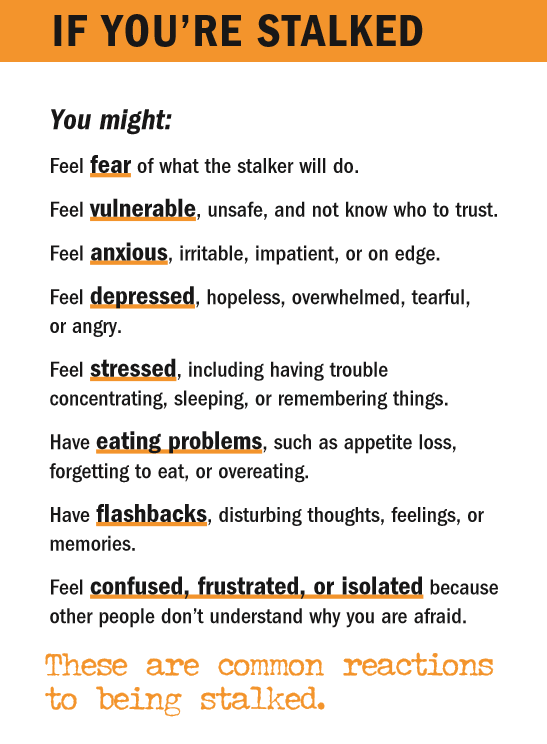January is National Stalking Awareness Month.
Stalking
Stalking is a crime of power and control, and defined as “a course of conduct directed at a specific person that involved repeated (two or more occasions) visual or physical proximity, nonconsensual communication, or verbal, written, or implied threats, or a combination thereof, that would cause a reasonable person fear,” by the National Institute of Justice.
1 in 3 women and 1 in 6 men will be stalked in their lifetime (Centers of Disease Control & Prevention). Most of the perpetrators are former/current intimate partners to the victims, or someone they know. This is not romantic or flattering. In fact, in 2019, approximately 67% of victims of traditional stalking and stalking with technology were fearful of being killed or physically harmed. Stalking can be so pervasive, that 86% of victims have reported a change is lifestyle or personality after experiencing stalking.
Roughly 58% of women and 49% of men were victims of stalking before the age of 25, which is a predominant age group of students on our campus.
Common things stalkers do (according to The National Center for Victims of Crime, Stalking Resource Center):
- Repeatedly call you
- Follow you, show up wherever you are
- Sending unwanted gifts, letters, emails, texts
- Damage your home, car, or other property
- Monitor your phone calls or computer use
- Use technology like hidden cameras or GPS to track where you go.
- Drive by or hang out at your home, school, or work.
- Threaten to hurt you, your family, friends or pets.
- Find out about you by using public records or on-line search services, hiring investigators, going through garbage, contacting friends, family, neighbors, or co-workers
- Other actions that control, frighten or track you.
Stalking is a crime in all 50 states, and victims are encouraged to keep a log of all the incidents they experience. This can be used as evidence if the victim decides to get law enforcement involved. Trust your instincts, if you are feeling unsafe from actions such as these, you probably are unsafe.
Get involved on campus to prevent Gender Based Violence:
- Visit the OASIS Center on campus in Gildemeister 110 to familiarize yourself with your resources. You can also email ws*@************na.edu to inquire about any volunteer opportunities.
Confidential Resources for Survivors:
- WSU Confidential Advocate: ws*@************na.org 507.452.4440
- WSU Health & Wellness Services 507.457.5160
- WSU Counseling Services 507.457.5330
- Advocacy Center of Winona Crisis Line 507.452.4453
Reporting Resources for Survivors:
- WSU Confidential Advocate: ws*@************na.org 507.452.4440
- Lori Mikl- Title IX Coordinator 507.457.5008
- WSU Security 507.457.5555
- In an Emergency, call 911


